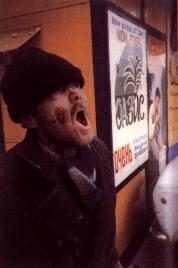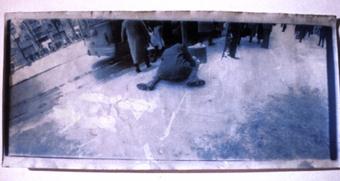|
Case History  Boris Mikhailov, From the series Case History, 1998
On the one hand, for myself personally, I understand that
taking pictures of poverty was my professional and civil duty.
On the other hand, I accept traditional clichés about
'not using others' grief" But what does "others' grief"
mean? And how must a photographer behave? Not since Diane Arbus, and perhaps not ever, has a photographer approached human subjects with such an unflinching, morally complex, and powerful gaze. Boris Mikhailov was born in 1938 in kharkov, Ukraine, where he continues to live and Work. In the late 1960s, the KGB found some nude photographs which Mikhailov had taken of his wife. This discovery resulted in the loss of his job as a technical engineer and as a consequence he decided to devote himself to photography. In the intervening three decades, he has become, with llya Kabakov, one of the most important artists to have emerged from the former Soviet Union. In this solo exhibition, Mikhailov's first in this country, we will be showing work from several of his series, all of which explore the position of the individual within the sphere of a public ideology, whether communism or capitalism. In the Red Series (1968-75), Mikhailov documents the slogans and symbols of the Soviet era as heroic backdrops to the mundanities of everyday life. His interest in the personal is also evident in the Private Series (late 1950s), intimate black-and-white photographs of people dancing, socialising, or lying naked in their apartments - aspects of private lives which had no place in the official iconography of the Soviet Union. Case History (1999) is Mikhailov's most recent work and arguably his most important. An unflinchinq, despairing sequence of nearly 500 colour photographs, this project explores the break-up of the Soviet Union by focusing on its human casualties, the bomzhes or homeless. The familiar figures of much 'humanitarian' social documentary photography, the homeless in Mikhailov's pictures become players in some existential tragedy, given money by the artist to be photographed, sometimes clothed, sometimes naked, or somewhere in between. The manipulation of people through money has become a new form of social relation in the former USSR - in this sense it has 'caught up' with the 'West' - and it is a relation which has infiltrated this project to its ice-cold heart.
 Boris Mikhailov, From By the Ground, 1991 |